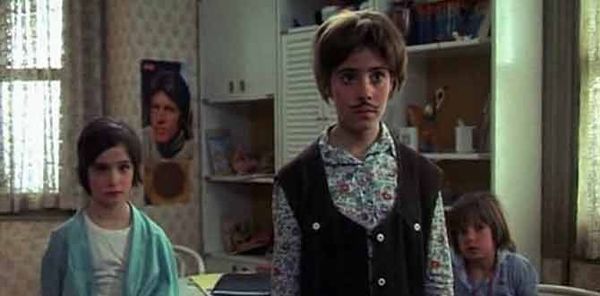Eye For Film >> Movies >> Cría Cuervos (1976) Film Review
Cría Cuervos
Reviewed by: Rebecca Naughten

Winner of the Jury Prize at the Cannes Film Festival in 1976, Carlos Saura's Cría Cuervos - the title refers to the Spanish proverb "raise ravens and they'll peck out your eyes" - uses a child's perspective to depict Spain in the dying days of the Franco dictatorship. The middle child of three sisters, eight-year-old Ana (Ana Torrent in a role that Saura wrote specifically for her) overhears her military father (Héctor Alterio) having sex with a family friend (Mirta Miller) and subsequently dying, with the woman fleeing the house. The little girl believes that she has caused her father's death after putting an unknown white powder - which she has been told is poisonous - into his drink. She holds him responsible for the prolonged illness and painful death of her mother (Geraldine Chaplin) a few years earlier.
Her mother's sister (Mónica Randall) arrives to take care of the girls and put the house in order, but unlike her sisters (played by Conchita Pérez and Maite Sánchez) Ana doesn't take to her aunt's disciplinarian ways and begins to plot her death as well. Aunt Paulina is of the belief that children should be seen and not heard, forgetting that that implies the presence of silent observers - and that grievances fester when they are left unspoken. The home where they live - cavernous, darkly lit and full of dark wood panelling and furniture - is stuck in the past with the air of a haunted house. The ghost who haunts the house and its occupants is Ana's mother, who appears to her daughter - through a combination of memory, dream, and imagination - as a source of comfort and reassurance.

The house stands for the closed-in and hermetically sealed Spain of the dictatorship years - the roles expected of women by the regime are clearly delineated across the various female characters. Filmed while Franco was dying, death permeates the narrative - whether Ana's obsession with death and dying, or the deaths of her father, mother, and the much-loved Roni the guinea pig - but despite the suffocating atmosphere of the house, the camera also repeatedly insists on showing the noise and bustle of life in the busy streets beyond the walls of the grounds. Along with Ana's defiant stance, this glimpsed outside world suggests that the regime's days are numbered.
Saura's camera makes no distinction between the past, present, or future (Chaplin also plays Ana some 20 years later, talking straight to camera about the sadness of her childhood) and therefore we experience the narrative as Ana's own stream of consciousness, in which her belief in something is enough to make it true - a commentary on how the present is shaped by our understanding and memory of the past. The girls spend almost the entire film inside the house and its grounds but in one sequence Ana sees herself standing atop a building on the other side of the road, looking down at her - suggesting that Ana has a different perspective on things in comparison to other family members (although this may be influenced by her future self looking back), and that she is already moving outside of the boundaries that have been set for her.
Less elliptical than The Spirit Of The Beehive, Saura's film nonetheless likewise acquires much of its lasting power from the combination of Torrent's dark-eyed, solemn gaze and its representation of how an impressionable child can have their imagination activated by events they don't fully understand.
Reviewed on: 16 Nov 2014

















